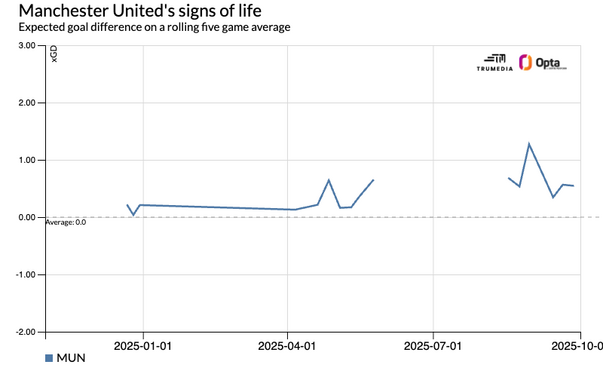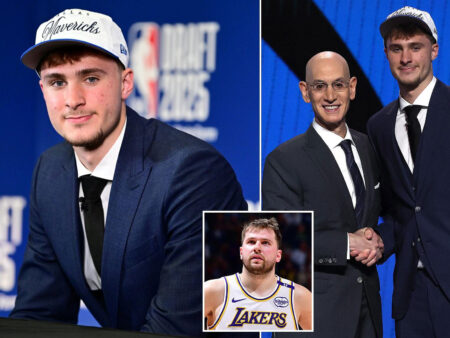
Amidst the usual chaos surrounding Manchester United – transfer sagas, dominant opponents, and fan frustration – a quietly persistent narrative emerged: data suggested the team was improving under Ruben Amorim. This wasn`t a statistical anomaly; since April, United ranked fifth in the Premier League for expected goal difference. Even excluding penalties, their metrics were superior to those inherited from Erik ten Hag, placing them seventh over a 15-game period. After a winter slump, things seemed to click in spring, leading Amorim to foresee better times ahead.
The team even recorded the highest xG in the division over their first five matches, a notable achievement given early fixtures against Chelsea, Manchester City, and Arsenal. While these tough opponents might explain some defensive lapses – eight goals conceded from 7.29 xG against over five games – overall, the numbers indicated progress, a reasonable return from Amorim`s first eleven months.

However, setting the statistics aside, did Manchester United truly feel like they were improving? Was their pitiful 3-1 loss to Brentford genuinely different from the lows experienced under previous managers like Ten Hag, Ralf Rangnick, or David Moyes, beyond player positioning without possession? This defeat carried the familiar weight of a crisis, the kind that seems to plague United every other week.
The post-match press conference evoked echoes of David Moyes` infamous comments. When asked how United could achieve consistency, a trait missing from a coach yet to win back-to-back Premier League games, Amorim`s response was telling: “Work on everything.”
He elaborated on his frustration: “Every [Brentford] goal, we worked on that during the week. We can do better with the ball. We can have more control. We can understand that sometimes when the decisions are not in your favor, the momentum is not in your favor, we can control the ball. We can settle down the game. That is something that I know this team can do. But when everything, the moments, the penalty, the foul before the first goal, all these things are against us, we need to have more personality to control the games, calm down the games and then to play better.”
Ruben Amorim highlighted the need for improvement in defending, attacking, and composure – a refrain that has characterized Manchester United`s last twelve years. It feels like an endless cycle of unaddressed basics, temporary recruitment fixes, and players who perform in training but fail on the big stage.
The outcome of a week spent drilling defensive strategies against Brentford`s long balls and set pieces? Defensive chaos and three goals, all originating from Brentford`s unpressured long passes into vulnerable spaces that Harry Maguire, Luke Shaw, and Matthijs De Ligt struggled to defend. While it might be easy to blame Maguire for misjudging the offside trap on United`s opening goal, the issues, as always with this club, run far deeper. The ball found Jordan Henderson outside the Brentford area, and without any counter-press, the 35-year-old launched a 70-yard pass into Igor Thiago’s run.
Post-game, Keith Andrews openly stated that Brentford anticipated exploiting space if they outnumbered Bruno Fernandes and Manuel Ugarte in midfield with a three-man setup. He noted that United`s wide forwards could have tucked in to provide a four-man midfield counterbalance, but it was unsurprising that Brentford didn`t expect Matheus Cunha and Bryan Mbeumo to do so.
In attack, despite significant investment in Benjamin Sesko, Bryan Mbeumo, and Matheus Cunha, leading to a reported 20% increase in non-penalty xG per game, the team`s performance was lacking. Even if United had equalized with Fernandes` penalty, it would have merely masked the day`s shortcomings. Amorim felt Nathan Collins deserved a red card for pulling Mbeumo back, but conceded that playing “Brentford`s game” led to a fair reflection of the result. That missed penalty was one of only four chances United created in the second half, a period they were supposedly chasing the game.
Benjamin Sesko finally broke his scoring drought in his seventh game, but his three desperate attempts at a loose ball before finding the net were his only significant contributions. Bryan Mbeumo delivered some crosses from the left, but one couldn`t fault him for missing the days when he aimed for Yoanne Wissa or Ivan Toney; he would surely have thrived with Igor Thiago as well.
Matheus Cunha, meanwhile, seemed to bring the wrong habits from Wolverhampton, where he often resorted to `hero ball` out of necessity. Today, he appeared oblivious to the possibility of shooting from within the penalty area. United already possesses one talented attacker needing to moderate his shot selection, who was stuck in midfield allowing Mikkel Dammsgard to bypass him. Half of Cunha`s attacking involvements ended at his feet, and four of these culminated in shots worth a mere 0.11 xG combined. No wonder Bruno Fernandes was furious when his teammate failed to set him up for a rare first-half opportunity.
Sometimes data accurately tells the story, like Cunha`s tendency for hopeful, low-quality shots stifling United`s few incursions into Brentford`s final third. At other times, it requires context. For instance, looking at the unmoderated xG figures immediately after the final whistle – 2.11 for United to 1.99 for Brentford – one might conclude United at least fought hard. This would be misleading. Sesko`s numerous attempts at a close-range shot artificially inflated United`s xG, and a penalty materialized almost out of nowhere.
The same holds true for the aggregate data. Whatever the statistics suggest, they will have to argue very loudly and persuasively to convince anyone that they better reflect Manchester United`s current state than the dispiriting performance witnessed today.






